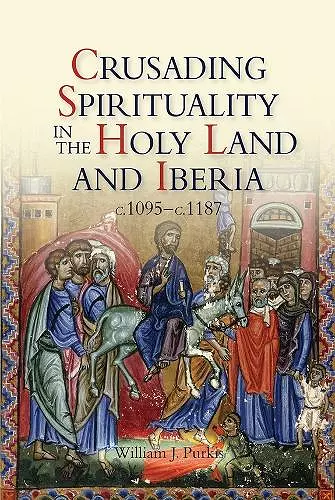Crusading Spirituality in the Holy Land and Iberia, c.1095-c.1187
Format:Paperback
Publisher:Boydell & Brewer Ltd
Published:21st Aug '14
Currently unavailable, and unfortunately no date known when it will be back

Argues for a new context for the origins and development of crusading, as an imitation of Christ. For much of the twelfth century the ideals and activities of crusaders were often described in language more normally associated with a monastic rather than a military vocation; like those who took religious vows, crusaders were repeatedly depicted as being driven by a desire to imitate Christ and to live according to the values of the primitive Church. This book argues that the significance of these descriptions has yet to be fully appreciated, and suggests that the origins and early development of crusading should be studied within the context of the "reformation" of professed religious life in the twelfth century, whose leading figures (such as St Bernard of Clairvaux) advocated the pursuit of devotional undertakings modelled on the lives of Christ and his apostles. It also considers topics such as the importance of pilgrimage to early crusading ideology and the relationship between the spiritualityof crusading and the activities of the Military Orders, offering a revisionist assessment of how crusading ideas adapted and evolved when introduced to the Iberian peninsula in c.1120. In so doing, the book situates crusading within a broader context of changes in the religious culture of the medieval West. Dr WILLIAM PURKIS is Senior Lecturer in Medieval History at the University of Birmingham.
Admirably steers the study of the crusades away from the somewhat repetitive narration of specific campaigns and focuses it on the heart of the matter - the spiritual experience of crusading. * SPECULUM *
A valuable contribution to crusade studies. [It] contributes to understanding crusaders on their own terms. * AMERICAN HISTORICAL REVIEW *
An informative discussion about spirituality, motivation and the appeals that popes, preachers, theologians and secular writers made to get those capable of bearing arms to do so in what was widely seen as the most just of all causes. The author has done a careful and nuanced reading of a wide variety of source materials ranging from papal encyclicals to well-known chronicles. * EHR *
A thoughtful, useful, and well-ordered discussion that fits into a number of current debates on the nature of crusading and its relation with changes in western European spirituality. Historians of the early crusades and of twelfth-century spirituality will benefit from Purkis's lively suggestions. * CHURCH HISTORY *
Offers a distinctive and original reading of the contemporary sources. [.] This fine first book argues persuasively for the enduring importance of spiritual ideals in understanding the impulses to violent action. * TIMES LITERARY SUPPLEMENT *
A valuable contribution to our understanding of eleventh- and twelfth-century spirituality. * . *
This book makes us rethink parts of how we understand the early crusades and how they are woven into the very fabric of twelfth-century European society. * THE MEDIEVAL REVIEW *
ISBN: 9781843839262
Dimensions: unknown
Weight: 354g
228 pages